An American in Cuba – Cultural Immersion
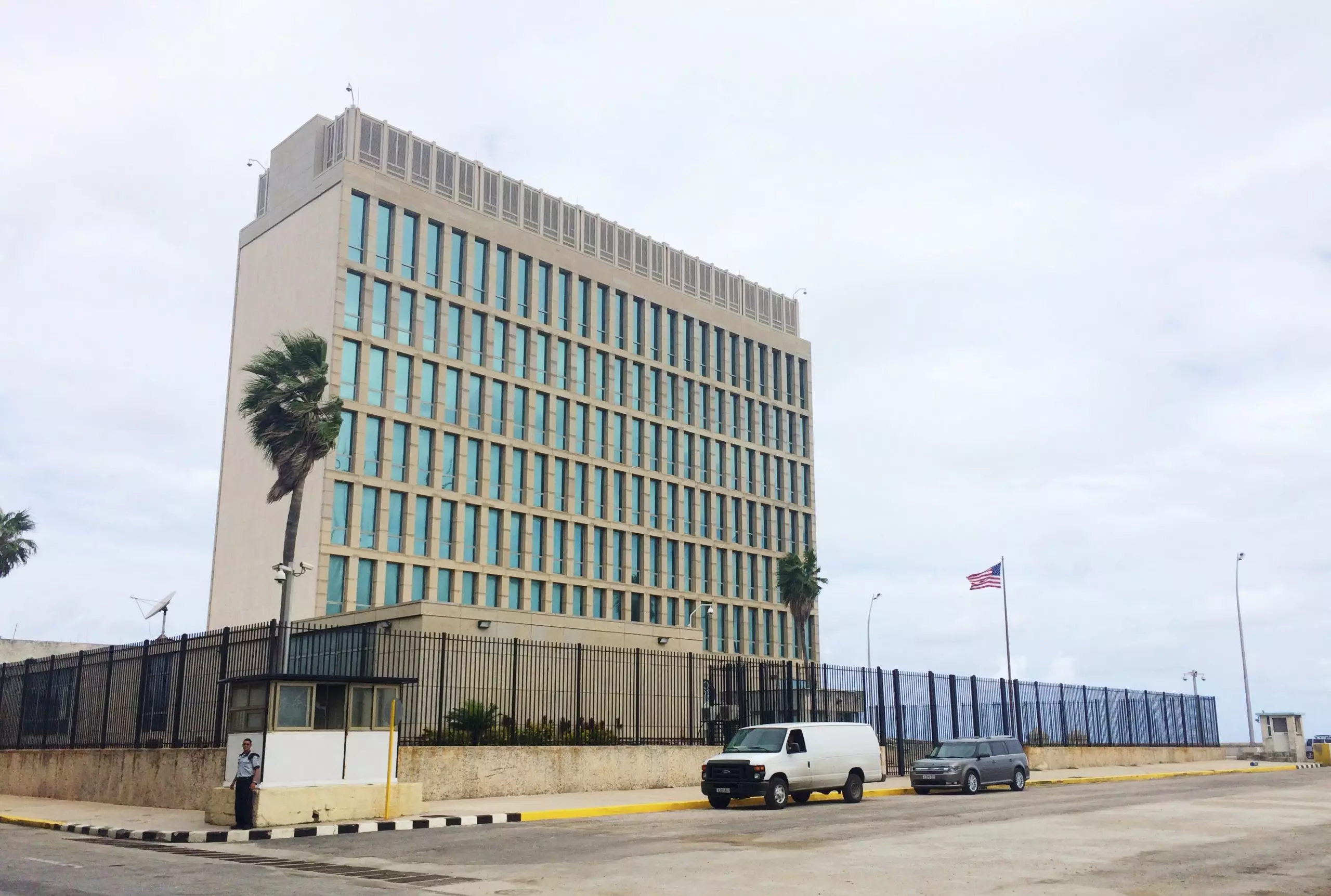

The Privileges of an American Student in Cuba
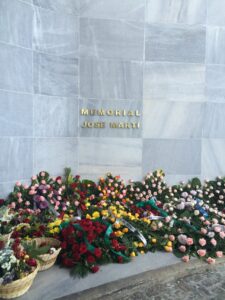
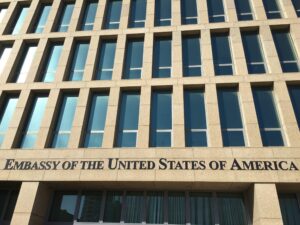
“American,” or what it means to “be an American” is not an idea I had ever truly stopped to consider. Prior to my semester abroad in Cuba, I had barely traveled outside the United States–a trip to Paris when I was six-months-old (which I continue to debate with my parents whether it really “counts”) and several trips to Canada. I have lived in the same house my entire life, so traveling and living abroad was a huge deal to me. Looking back now, I realize that when deciding to study abroad in Cuba, I did not ask myself several important questions, including, “What will it be like to be an American studying abroad in a country that has not had a friendly relationship with the United States?” or, “Will being American have an effect on my experience in Cuba?” I put a lot of thought and effort into planning and preparing for my trip, but I recognize now I was asking some of the wrong questions.
Being an American in Cuba is complicated and messy. Since I was a student on a visa through the University of Havana, I was considered a temporary Cuban resident. Through my temporary status, I received a “carnet,” a laminated card that looked homemade but allowed me access to everything at Cuban prices. Living in Cuba, as both a temporary resident and as a foreigner, gave me access to two worlds through two currencies. I immediately recognized that being an American student offered me privileges that Cuban university students did not have. I found the boundary line difficult to navigate, as my American dollars went far when converted into the Cuban currencies; I was able to go out and enjoy beautiful ocean-side pools and nice restaurants at standards I could not afford back in the United States, while still going to museums at a discounted rate and eating at local paladares for less than $3. As a result, I had trouble finding my place–I wanted to immerse myself in the culture and life of Havana itself, and yet I stuck out like a sore thumb with my American accent and my clothes.
An Outside Perspective on United States Politics
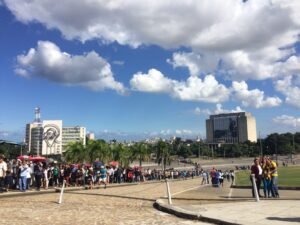
A few weeks leading up to the 2016 election, I walked to the U.S. Embassy, an ugly, intimidating building that sits right by the seawall, to cast my absentee ballot. I woke up early to go to the Embassy before my morning class, and yet when I arrived at the Embassy, there was already a small line forming of Cubans dressed up and holding bright plastic folders for their visa interviews. I will not forget the feeling of walking past the line to the security guard and handing them my United States passport, being ushered through the gates, past everyone waiting, to the special section of the Embassy that is exclusively for American citizens. I can say with certainty that was the moment I truly realized the significance of that little blue and gold embossed booklet. I realized that the freedom I enjoyed by being an American was not universal to all citizens around the globe.
That day I cast my ballot, I admit that I assumed Hillary Clinton was going to be the 45th President of the United States. Cubans would constantly ask me and my fellow American peers our opinions on the election and offer their own thoughts on the subject. Every time the question was raised, without hesitation, we would say there was no way Trump would be elected into office. I lived under that illusion until the night of the election when all of us American students and the tourists staying at the Habana Libre Hotel crammed into their bar and watched the results play out on the big screen TV–the same TV we had watched the Cubs break their curse in the World Series and the presidential debates leading up to this night. There was a sense of camaraderie that night; as the shock and results sunk in, it was comforting to know we were surrounded by fellow Americans.
Waking up after the election, I sensed a shift in Cubans’ responses towards Trump’s victory. My host mother did not seem to empathize with some of our distraught and emotional reactions to the result. Cubans dismissed the election saying that there was nothing the U.S. could do at this point to break them–they saw the election as a continuation of the past 50 years. I felt as though they did not understand the true impact the election could have on their country and felt shame that I was now part of a society that was espousing ideas that I saw as dangerous for the U.S. and around the world. The election made me feel more of an outsider because I felt let-down by fellow Americans and felt a loss of control in defining my own destiny. During this time, however, I had a particularly comforting and memorable conversation with a taxi driver that has stuck with me–he reminded me that I was here in Cuba and was welcomed with open and friendly arms. While our governments might not see eye-to-eye, we are all humans, and fundamentally our people are similar to theirs. Politics is, in some ways, a made-up construct by groups of individuals, but each person is more than their politics and it is important to remember that. Unfortunately, I never got the driver’s name, but I even still continue to think about what he said upon my return to the States.
An Outside Perspective soon Cuban Politics
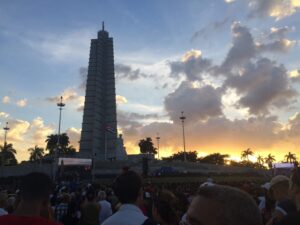
Talk about the election did not last long, because just two weeks afterward, Cuba was hit with the loss of Fidel Castro. While there was a mixture of reactions amongst the public, the loss of the revolutionary leader was deeply felt around the country. During a nine-day luto, or mourning period, the country stopped all festivities; the international ballet festival was postponed, the music ceased to play on the streets and no alcohol was served. The people lined up and waited hours to pay their respects at the Plaza de la Revolución, and the university students held a memorial and marched from the university steps to the Plaza. The events culminated in a night of speeches by presidents and diplomats from around the world who flew to Havana to pay their respects. I attended these events with my fellow American classmates and was surprised that no one questioned our presence. Part of me felt that being there at the events was overstepping our place as visitors to their country. As far as I could see, no American dignitaries were present, and that was a strange realization for me. I also experienced mourning like I could never envision happening in the United States. I would never expect commerce and individual freedoms in the U.S. to be impacted to this extent by the death of a leader.
Not to sound glib, but I learned a lot about myself during those few months abroad. I continue to reflect upon my experience in Cuba; what it means to have visited, and what it means to be back in the States after such an adventure. My question of “what it means to be an American abroad” cannot ever have a final, concrete answer, as past and future experiences will continue to shape my thoughts. I am certain of this: I am grateful to all the people who welcomed me and took me into their shared experience. They taught me that it is important to see and recognize each other as individuals, and the enormity of the world feels smaller and less intimidating when we meet others outside of our own country.
Anna Santiago was a Peace and Conflict Studies major at Colgate University, and studied abroad with IFSA through the Universidad de La Habana in the fall of 2016.